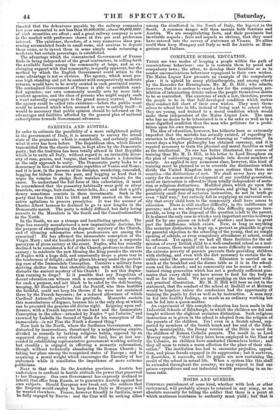COMPLETE SCHOOL EDUCATION.
THERE are two modes of keeping a people within the path of conscientious behaviour : one is to restrain them by penal and compulsory laws ; the other, to develop their faculties so as to render unconscientious behaviour repugnant to their own wishes. The Maine Liquor Law presents an example of the compulsory plan : it is upheld by many philanthropists, and among others by the Recorder for Birmingham, Mr. N. D. Hill ; who admits, however, that it is useless to enact a law for the compulsory pro- hibition of intoxicating drinks unless the people themselves desire to be so controlled. The existence of such a law, therefore, proves the people to be in that half-developed condition which makes their conduct fall short of their own wishes. They send them- selves to school late in life, instead of being sent to school when they are young, and trained to a moral condition which would make them independent of the Maine Liquor Law. The man who has no desire to be intoxicated is in a far safer as well as in a more dignified condition than the man who petitions for a prohi- bition upon his own trespasses. The idea of education, however, has hitherto been so extremely imperfect that the mistake has actually existed, of regarding in- struction in the ordinary elements of learning as "education." In recent days a higher philosophy has obtained currency, and it is reputed necessary to train the physical and moral faculties as well as the intellectual. No one has better illustrated this course of training than Mr. M. D. Hill, in his letter to Lord Brougham on the plan of cultivating young vagabonds into decent members of society. As applied to any numerous class, however, this kind of training must be planned so as to override the distinctions which divide the United Kingdom into more sections than there are counties—the distinctions of sect. We shall never have any se- curity for the commonest development of our youthful generation, until an instruction is offered to thein totally independent of secta- rian or religions distinctions. Modified plans, which go upon the principle of compromising these questions, and giving but a com- paratively small dose of sectarian instruction, do not in truth go even "half way," but entirely fail in supplying an universal secu- rity that every child born to the community shall have access to education. There is still another difficulty, in the indifference of parents; and, as we observed lately, this difficulty appears insu- perable, so long as the disposal of the question is left to the parent. It is almost the only case in which a very important service is always paid for by one person on behalf of another ; and hence in great part the indifference which exists. Now, so long as anything like sectarian distinction is kept up, a pretext so plausible is given for parental objection to the schooling of the young, that no simple opening of schools, or even compulsory attendance at school, could be enforced. Yet again, if we had all these facilities for the ad- mission of every British child to a well-conducted school as a mat- ter of course, there would still be one more difficulty to surmount: the extreme poverty of parents prevents their providing children with clothing, and even with the diet necessary to sustain the fa- culties under the process of tuition. Education is carried on as much at the breakfast and the dinner table as it is in the school- room and the church ; and no community can be secure of a well- trained rising generation which has not a perfectly sufficient gua- rantee that every child can have access to food for the body as well as for the mind. We are not speaking on this subject with- out practical illustration. Mr. H. D. Hill will bear us out in the statement, that the conduct of the school at Redhill or at Mettray would be hopeless unless the conductors had the opportunity of training the pupils by diet as well as by instruction. A man may , be fed into healthy feelings, as much as an ordinary working bee can be fed into a queen-mother. An experiment of this complete education has been made in the Industrial Schools of Edinburgh, in which the children are fed and taught without the slightest sectarian distinction. Such religious instruction as is given in the school is adopted from the religion of the parents of the children. Yes ! even in a Scotch school, sup- ported by members of the Scotch bench and bar and of the Edin- burgh municipality, the Douay version of the Bible is used for the children of Roman Catholic parents. The result is, as Lord
Murray reports, "that if they have been employed in the Fleet or the Colonies, no children have conducted themselves better ; and they all seem to retain a warm affection for the place of their edu- cation." The institution has had to encounter prejudice, opposi- tion, and pious frauds engaged in its suppression; but it survives, it flourishes, it succeeds, and its pupils are now sustaining the credit of the school in actual life. When a system like this shall - be extended throughout the country, we may expect to find our prison expenditure and our industrial wealth proceeding in an in- verse ratio.






























 Previous page
Previous page